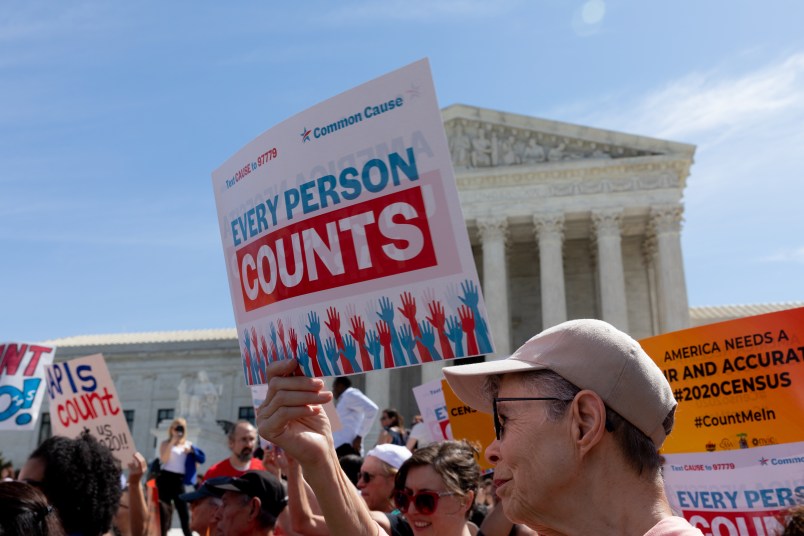The Supreme Court has upheld a decision blocking the Trump administration from adding a citizenship question. The court’s ruling left the administration with broad wiggle room to add the question in the future.
Lawyers for the groups challenging the citizenship question said it was possible that the administration might try to re-add the question for the 2020 census but said they were skeptical that it had enough time to do so.
In a complicated decision which was unanimous in some parts and split in others, the court said that it didn’t buy that administration’s stated reason for adding the question to the census, allegedly for Voting Rights Act enforcement. Chief Justice John Roberts, who wrote the majority opinion, appeared to give the liberal justices the key fifth vote in parts of the decision that blocked the question for now.
“Altogether, the evidence tells a story that does not match the explanation the Secretary gave for his decision,” Roberts said, calling the VRA justification a “distraction” and” contrived.”
The decision upheld a lower court’s ruling the the Trump administrations could not add the question to census unless it went through the proper protocols and provided a legitimate reason for doing so.
The decision, however, gave the Commerce Department broad authorities that could allow it to add a citizenship question in the census. Though the administration has claimed that it needs to send the forms to the printer next week, a Census Bureau official testified that by tapping “extraordinary resources” the printing deadline could be pushed back as late as Oct. 31.
Much of Roberts’ opinion gave credence to the arguments the Trump administration made in court, including that it was “reasonable” for Commerce Secretary Wilbur Ross to overrule the concerns of the Bureau that the question would discourage participation on the survey.
The opinion also said that the Enumeration Clause does not prohibit a citizenship question on the census. Lower courts had found that it had because it risked the accuracy of the census count.
It’s unclear yet if the decision is a short term set back for the administration or if it will have the effect of permanently blocking the question from being added to the census.
The Supreme Court appeared willing to greenlight a citizenship question if it believed the justification the government provided for adding it was at least one of the reasons it was being included.
But in this case, the VRA enforcement rationale — the sole reason provided by the government — was too divorced from the record of evidence to let the administration’s action fly.
“[W]e cannot ignore the disconnect between the decision made and the explanation given,” the court said.
The Supreme Court said that it agreed with the government that there was nothing necessarily objectionable for Ross to be looking into adding a citizenship question in the early days of the administration.
But the record, the court said, “contains no hint that he was considering VRA enforcement in connection with that project.”
The Supreme Court noted that Ross’ aides reached out to various agencies seeking that they make the request for the question and that initial process of shopping around did not involve agencies responsible for VRA enforcement.
“[I]t was not until the Secretary contacted the Attorney General directly that DOJ’s Civil Rights Division expressed interest in acquiring census-based citizenship data to better enforce the VRA. And even then, the record suggests that DOJ’s interest was directed more to helping the Commerce Department than to securing the data,” the court said.
The court pointed to the heavy involvement of Commerce Department officials in drafting the DOJ request for the question, as well as the Justice Department’s refusal to meet with the Census Bureau to discuss the data request.
This suggested “a lack of interest on DOJ’s part,” Roberts said.







¡Es un milagro!
Toadglans should be tweeting a threat to fire them any moment now.
Only temporary, and this isn’t over. Basically gives Commerce another shot at making up a Bullshit lie about their motives which Scotus would buy.
My bar was low enough for these guys that I’m genuinely impressed.
Edit: was unaware of the gerrymandering decision. Nevermind
This and the gerrymandering fiasco are supposed to balance each other out.
So both the good guys and the bad guys won one.
(No, justice and the law aren’t supposed to work that way.)
So is there time for Ross et. al. to fulfill these requirements and get it on in time anyway?